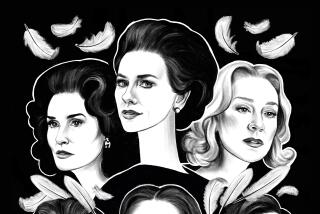TV REVIEW : ‘UNANSWERED PRAYERS’: A BIOGRAPHY OF CAPOTE
- Share via
What a sad, moving program is “Unanswered Prayers: The Life and Times of Truman Capote,” a critical biography of an apparently tormented writer as well known for his witty, chatty, mincing, acerbic talk-show appearances as for his art. He died in 1984.
Poignant, biting, stabbing, mysterious, the British-made hour airs at 8 tonight on Channel 50 and at 9 tonight on Channels 28 and 15 as part of the PBS “American Masters” series. It is at once a celebration and a wake, toasting the best of Capote the literary talent, while exploring his darker side--the ultimately clogged, creatively burned-out celebrity who was burdened with trying to match his own masterwork, “In Cold Blood.”
Amateur analysts love to lavish their two-bit psychology on Capote, a man whose behavior was often bizarre by conventional standards. (There is utterly grim footage here of a bloated Capote appearing with talk show host Stanley Siegel, unalert and out of it, slurring his words as if heavily boozed or drugged.)
This program takes a high road, however. Capote is presented from his own perspective--he endlessly talked about himself in public appearances and in his writing--and through the eyes of those who knew him best.
“He was adorable,” says his longtime companion, Jack Dunphy.
Most candid of all, perhaps, is Capote’s perceptive aunt, Marie Rudisill, whose reflections on his troubled Southern childhood and his career offer insights into his personality and writing. “Truman was a writer of moods,” she says. “You could always tell what kind of mood he was in by what he was writing.”
Capote is heard reading passages from “In Cold Blood,” his acclaimed account of the 1959 murder of a rural Kansas family by two drifters, and he recalls how close he became with one of the murderers. Scenes from the movie adaptation of the book add a chilling significance to his words.
The hour’s title is a play on “Answered Prayers,” the unsparing novel that Capote had said he was writing about the jet-setters with whom he hung out. Published excerpts from early chapters made him an outcast with these people, the very ones who had spent years fawning over him.
Curious, how a program can be utterly fascinating, yet in the deepest sense, unrevealing. This one captures the silhouette but not the soul of Capote, who remains an enigma, a caricature in outline, as unfinished as the “Answered Prayers” manuscript he was writing when he died.
More to Read
The complete guide to home viewing
Get Screen Gab for everything about the TV shows and streaming movies everyone’s talking about.
You may occasionally receive promotional content from the Los Angeles Times.






